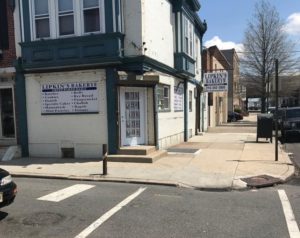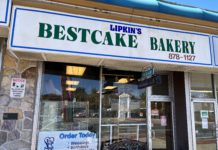
At Lipkin’s Bakery in Northeast Philadelphia, the knish extruder pumped out more than 35 knishes a minute like the infamous “I Love Lucy” chocolate conveyor belt.
With the high demand for the potato knish, a favorite among customers, Lipkin’s produced a whopping 2,592 of the potato-filled pastries per week, but hey, who’s counting.
Lipkin’s Bakery owner Steven Nawalany is. The knish has been his prized product at Lipkin’s since he took over the business from Mitch Lipkin with J Franciotti in 2016.
“New York is supposed to be the knish capital of the United States,” he said. “But people have come down from New York — we’re gonna ship stuff to them — because they like our knishes better.”
But as of last week, the knish extruder at Lipkin’s has been shut off. The bakery closed its doors to the public on May 2 and stopped delivering to partnering synagogues and delis a week after.
Feeling the strain of economic challenges, Nawalany, 55, is selling the building, though Lipkin’s baked goods are far from gone from Philadelphia.
Nawalany had trouble hiring employees to interact with customers. He had plenty of back-of-house help in the kitchen but lacked committed employees at the front.
“Another big part of it was the ingredients,” Nawalany said. “The location we were in, you can only raise the price so much.”
Lipkin’s still sold knishes in the store for $1.50 each, a remaining vestige of the Lipkin family belief that everyone should be able to afford a high-quality product.
But sourcing ingredients — baker’s cheese, eggs and butter — was near impossible at times, Nawalany said. When the products were available, they were expensive.
Before the pandemic, cream cheese cost $48 for a 30-pound block; in the weeks before Lipkin’s closing, Nawalany paid $128 for the same amount. If there was a listeria breakout at a Pennsylvania chicken farm, the price for eggs jumped drastically.
Though brick-and-mortar retail is unsustainable for Nawalany, he’s ready to pivot to a smaller operation, providing wholesale knishes.
A wholesale bakery would allow Lipkin’s to attain a more rigorous kosher status with Keystone K, making it one of the few kosher bakeries in the area. They would be able to take Saturdays off for Shabbat, a luxury Nawalany couldn’t afford with a retail storefront.
He’s working with partners to find a new space near Rittenhouse Square.
Nawalany is certain the demand for his products is there, but he didn’t realize the extent of the demand until he closed his doors.
“I didn’t realize how big we actually were,” Nawalany said. “Then Michael Klein from The Inquirer wrote [an article], and then literally all hell broke loose. People were coming in and buying four, five, six dozen knishes at a time just to freeze them.”
For loyal customers, Lipkin’s is symbolic of a quintessential Jewish bakery, a staple in American Jewish communities.
“They say you cannot be Jewish on an island, that being Jewish is being part of a community, and part of your community means your food and your people around you,” Abington resident Irénke Margit said. “Having Jewish places for Jewish community is sort of a Philly cornerstone, I think, of a community.”
The origins of Lipkin’s, however, started out a little lonelier, when the grandfather of Mitch Lipkin, a baker, emigrated from Poland to the United States. Secretly taking shelter on a boat, Lipkin was diverted by the ship’s crew, who threatened to throw him overboard into the ocean, Nawalany said. Lipkin made the argument that he had a greater purpose on the ship and in America: He could bake.
Upon arriving in Philadelphia, Lipkin bought a South Philadelphia bakery space from the Lipton family. After a fire in the South Philadelphia location, the bakery moved to two locations in the Northeast; another fire at one location gave Lipkin’s its home on Castor Avenue.
It’s the same spot Barbara Ravisky has patronized since the 1970s, favoring the bakery’s hamantaschen and rye bread over the knishes. Ravisky, 79, remembers Lipkin’s as always being packed.
“Everybody would come in — it was always crowded,” she said. “Sometimes you couldn’t even go into the store. You had to wait until someone got the order and left.”
Before Nawalany took over, he was in the automotive service business for 25 years but loved the job for the social component: He loved greeting customers.
He was also a decades-long fan of Lipkin’s, with the bakery even supplying his cake for his bar mitzvah. It’s a love that continues today, making the interim period between bakery spaces bittersweet for Nawalany.
“It’s only been a couple of days, and I miss it,” he said.




